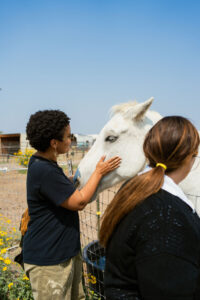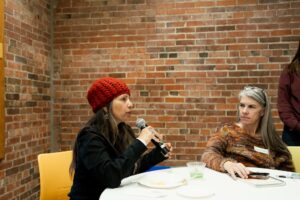The Challenge of Unequal Access
The core truth of collective action is that good programming depends on how—and to whom—money actually flows. Too often, public funding intended for important work, like regenerative agriculture or clean energy education, stops short of reaching the people closest to the issues—smaller producers, historically underserved farms, and community members with lived expertise. This happens because traditional funding structures and application processes often create major barriers to access.

Existing funding mechanisms, even those with great intentions, like Colorado’s Healthy Soils programs or state-level grants, can fail in practice. For example, in the Healthy Soils work, the mechanisms were in place to pass federal funds to producers, but many smaller farms couldn’t navigate the applications and administrative requirements, or access the technical support needed to claim the funds. The problem isn’t the funding’s availability; it’s the accessibility and the structure itself that prevents equitable disbursement.
If funding structures aren’t actively redesigned for access and equity, public programs will continue to exclude the people they are meant to serve, limiting overall impact and perpetuating cycles of power imbalance. This means important work won’t reach the right hands, and the invaluable knowledge of on-the-ground experts will be left out of decision-making.
Our Position: Changing the Flow, Shifting the Power
The Alliance for Collective Action is committed to a simple truth: when money moves differently, power moves differently. We believe equitable outcomes aren’t an add-on; they must be baked into how funding is designed and delivered. Our approach focuses on two key structural changes:
- Providing Wrap-Around Support: We don’t just push money through a channel, we build the scaffolding, like outreach, application assistance, and flexible disbursement, to ensure funds reach historically excluded communities. In the Healthy Soils work, for example, we channeled thousands of dollars and offered hands-on support to producers who would have been left out otherwise.
- Changing the Mechanism: We work with partners, like the Colorado Department of Transportation (CDOT) on the EV Education program, to restructure grants and convert funds into direct compensation for community members’ time, lived expertise, and contributions. This shifts grant money into real monetary compensation and decision-making power for stakeholders.
Taking Action for Equity
The Alliance for Collective Action actively intervenes to center accessibility, not just intention. We do this by:
- Building trust and providing supportive services that close the gap between funding potential and real-world access.
- Bringing on-the-ground insights back to state decision-makers to advocate for programmatic changes that make public programs more inclusive, practical, and responsive over time.
- Reimagining grant structures to pay community members directly, recognizing that their expertise is an asset that deserves compensation.

By changing the rules and supporting access, this model achieves equitable outcomes and amplifies collective impact. When funding is accessible and community expertise is valued and compensated, public programs become more inclusive, effective, and rooted in the knowledge of those doing the work. This ultimately shifts power toward the communities living the work every day.
